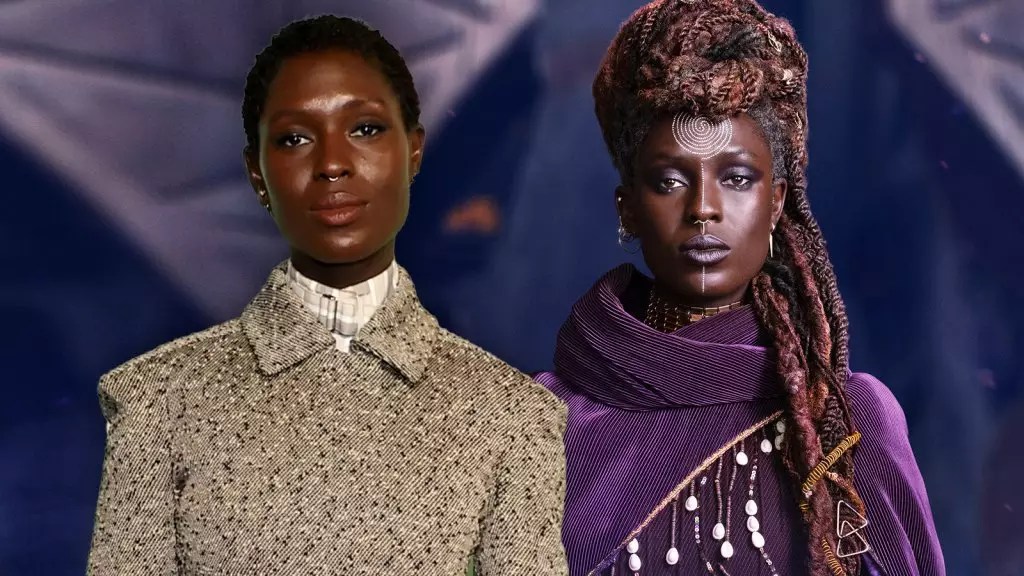In today’s entertainment landscape, representation and inclusivity are not merely buzzwords; they are fundamental values that significantly impact how audiences perceive themselves and each other. The recent remarks by Jodie Turner-Smith regarding Disney’s lack of action against the vitriolic cyberbullying faced by her co-star Amandla Stenberg highlight the urgent need for industries to foster a safer and more supportive environment for underrepresented voices. Stenberg, known for their role in Disney+’s *The Acolyte*, has experienced an onslaught of online hostility that calls into question the support provided by large corporations to their diverse casts.
In her interview with Glamour UK, Turner-Smith did not mince words. She criticized Disney for its apparent silence while Stenberg endured online harassment linked to their representation in a beloved franchise. Turner-Smith expressed disappointment that a company with significant financial resources and influence would fail to protect its talent when faced with blatant racism and inhumanity from fans. Her comments raise vital questions about the responsibility that production studios have to their artists, especially in the face of toxic fandoms that exploit anonymity to spread hate.
Turner-Smith argued for a more robust corporate response, advocating for action against racism instead of passively allowing it to fester. “It would just be nice if the people that have all the money were showing their support and putting their feet down,” she said. This statement underscores a greater expectation for corporations—not just to profit from diversity, but to actively champion the individuals who embody those identities in their narratives. The lack of robust statements from Disney or similar entities indicates a failure to recognize their power to effect change and speak out against intolerance.
Stenberg’s experiences illuminate the complexities of navigating public scrutiny when one occupies an underrepresented identity in mainstream media. The young actor referred to the bullying as “hyper-conservative bigotry,” providing insight into the climate many queer, BIPOC actors face. Despite the difficulties, Stenberg found the strength to address these challenges openly, stating, “I feel like I’ve kinda moved through those feelings in various ways, including being vocal about it myself.” Such resilience is commendable, but it should not solely rest on the shoulders of the affected individuals.
The digital landscape has become increasingly hostile, particularly for those who disrupt traditional narratives. Cyberbullying not only affects the mental health of the victims but also jeopardizes the diversity of storytelling in media. Stenberg’s decision to vocalize their struggles through music draws attention to the urgent need for empathy and understanding, yet it also exemplifies how marginalized voices often feel compelled to fight their battles alone. The absence of impactful backing from large production companies and franchises can render these individuals voiceless and isolated in their struggle.
Cyberbullying is a societal ill that urges collective action. Turner-Smith’s critique sheds light on the silence that often permeates the industry regarding online harassment and the lack of a unified front against it. By refusing to take a stand, companies inadvertently condone the behavior, creating an environment where hatred flourishes. Instead, Turner-Smith calls for those at the top to denounce such actions vehemently, reinforcing the idea that being a fan does not include hatred.
Turner-Smith’s impassioned plea for justice and recognition of Amandla Stenberg’s artistry serves as a powerful reminder of the responsibility that the entertainment industry has toward its creators—especially those from underrepresented backgrounds. The need for studios to proactively support their talents against cyberbullying cannot be overstated. By standing up against intolerance, they can create a more inclusive and respectful environment that not only protects its employees but also enriches the narratives that resonate with a broader audience.
Ultimately, the challenge lies in transforming corporate policies and culture to better reflect these ideals. As public figures wield their influence, the hope is that industries will begin to act decisively and assertively against racism and hatred, thus fostering an environment where every artist can thrive, and every story can be told without the shadow of fear.


Leave a Reply